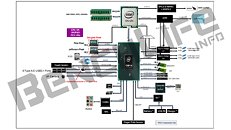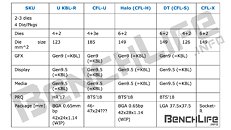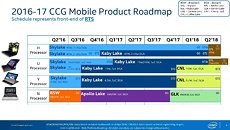- Joined
- Oct 9, 2007
- Messages
- 47,849 (7.39/day)
- Location
- Dublin, Ireland
| System Name | RBMK-1000 |
|---|---|
| Processor | AMD Ryzen 7 5700G |
| Motherboard | Gigabyte B550 AORUS Elite V2 |
| Cooling | DeepCool Gammax L240 V2 |
| Memory | 2x 16GB DDR4-3200 |
| Video Card(s) | Galax RTX 4070 Ti EX |
| Storage | Samsung 990 1TB |
| Display(s) | BenQ 1440p 60 Hz 27-inch |
| Case | Corsair Carbide 100R |
| Audio Device(s) | ASUS SupremeFX S1220A |
| Power Supply | Cooler Master MWE Gold 650W |
| Mouse | ASUS ROG Strix Impact |
| Keyboard | Gamdias Hermes E2 |
| Software | Windows 11 Pro |
Intel's upcoming "Coffee Lake" micro-architecture, or the 9th generation Core processor family by Intel, is scheduled for launch in the second half of 2018. It succeeds the 8th generation "Cannon Lake" family of notebook processors (which likely doesn't see a desktop launch), and the 7th Gen Core "Kaby Lake" socket LGA1151 processors slated for January 2017. While it's not known if mainstream desktop "Coffee Lake" chips will continue to be based on the LGA1151 socket, the possibility is diminishing, looking at a platform layout diagram leaked to the web by Benchlife.info, supported by new connectivity interfaces coming out of the CPU package. The biggest selling-point of "Coffee Lake," is its core-count.
The 9th generation Core "Coffee Lake" family could introduce Intel's first 6-core processor to the mainstream desktop platform. The company's first 6-core client part was launched in its LGA1366 HEDT (high-end desktop) platform with the Core i7 "Gulftown" processor, way back in 2010. An increase in core-count from 4 has eluded the mainstream-desktop lineup. The 6-core "Coffee Lake" silicon will be built on a highly-refined 14 nm node by Intel, with a die-size of 149 mm². Quad-core parts won't be carved out of this silicon by disabling two cores, but rather be built on a smaller 126 mm² die. For reference, the quad-core "Kaby Lake" die is expected to be 123 mm², and the current quad-core "Skylake-D" die measures 122.6 mm².



View at TechPowerUp Main Site
The 9th generation Core "Coffee Lake" family could introduce Intel's first 6-core processor to the mainstream desktop platform. The company's first 6-core client part was launched in its LGA1366 HEDT (high-end desktop) platform with the Core i7 "Gulftown" processor, way back in 2010. An increase in core-count from 4 has eluded the mainstream-desktop lineup. The 6-core "Coffee Lake" silicon will be built on a highly-refined 14 nm node by Intel, with a die-size of 149 mm². Quad-core parts won't be carved out of this silicon by disabling two cores, but rather be built on a smaller 126 mm² die. For reference, the quad-core "Kaby Lake" die is expected to be 123 mm², and the current quad-core "Skylake-D" die measures 122.6 mm².



View at TechPowerUp Main Site




 Yet I can say easily, that there have been a tonne of comments about how a user's 2600K is good enough for gaming, and upgrade won't bring much... which is quite contrary to the idea that Intel needs to "innovate".
Yet I can say easily, that there have been a tonne of comments about how a user's 2600K is good enough for gaming, and upgrade won't bring much... which is quite contrary to the idea that Intel needs to "innovate".
 My TI-89 is over 10 years old and the new ones don't look much different.
My TI-89 is over 10 years old and the new ones don't look much different.